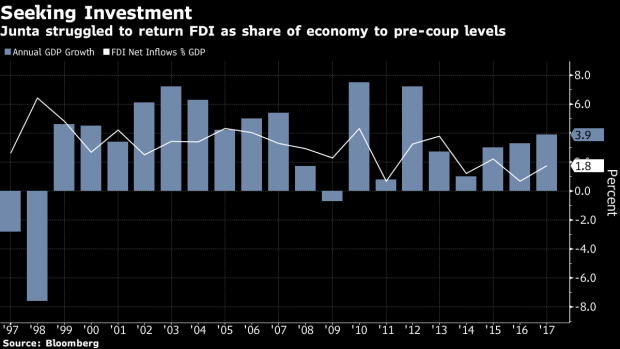Feb 17, 2019
Political Risk Looms Over Thai Economy as Election Stirs Tension
, Bloomberg News

(Bloomberg) -- Political tension has emerged as a threat to the domestic economic drivers Thailand is relying on amid a global slowdown.
A push to disband a political party over a failed bid to make a princess its prime ministerial candidate lays bare deep splits ahead of a March general election, the first since a coup in 2014. The unfolding drama is a reminder of Thailand’s cycle of elections, unrest and military intervention since 2006.
"We don’t expect election-related chaos as we approach the election date," said Eugenia Victorino, head of Asia strategy at Skandinaviska Enskilda Banken AB in Singapore. "However, the ability to form a stable government is vital in the continuity of the recovery in private investments."
Forecasters such as the World Bank expect rising private consumption and investment in Southeast Asia’s second-largest economy to fill much of the gap from easing exports this year. The risk is that domestic instability could lead companies and consumers to delay spending.
Economists estimate growth recovered last quarter after a sharp slowdown. Gross domestic product probably expanded 3.6 percent in October to December from a year earlier, a Bloomberg survey shows ahead of a report due 9:30 a.m. Monday in Bangkok. Full-year 2018 growth is seen at 4.1 percent.
Faster Neighbors
While Thai growth has recovered since 2014 -- when unrest brought the economy to a near standstill and sparked the coup -- the pace still lags neighbors in Southeast Asia.
Domestic Drivers
As exports wane, consumer spending and private investment are relative bright spots that make some analysts optimistic. GDP is set to climb 4.5 percent in 2019 as the economy shrugs off "recent political noise," said Tim Leelahaphan, a Standard Chartered Bank economist in Bangkok.
FDI Falling
Foreign direct investment as a share of the economy has declined during a more than decade-long power struggle between exiled former leader Thaksin Shinawatra and the military and royalist elite. Thaksin or his allies have won every election since 2001, only to be unseated by the courts or the military.
Waning Price Pressures
Price pressures have waned in Thailand, partly because of a surge in the baht. Together with an uneven economic outlook, that’s adding to the case for leaving interest rates unchanged after December’s quarter-point increase.
"Baht outperformance and a pullback in global oil prices reinforce our expectations of a pause in policy rates this year," said Radhika Rao, an economist at DBS Bank Ltd. in Singapore.
To contact the reporter on this story: Suttinee Yuvejwattana in Bangkok at suttinee1@bloomberg.net
To contact the editors responsible for this story: Sunil Jagtiani at sjagtiani@bloomberg.net, Shamim Adam
©2019 Bloomberg L.P.






